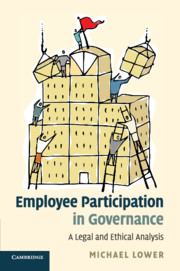Book contents
- Frontmatter
- Contents
- Acknowledgements
- Tables of legal instruments
- 1 Introduction
- 2 Catholic Social Thought: nature, sources and core principles and values
- 3 Catholic Social Thought and work
- 4 Catholic Social Thought, private property and markets
- 5 The corporation
- 6 The firm and society
- 7 Employee participation in corporate governance: an ethical analysis
- 8 Corporate Governance in the United Kingdom
- 9 Labour law and employee participation
- 10 Employee participation and EU corporate governance
- 11 Conclusion
- Bibliography
- Index
5 - The corporation
Published online by Cambridge University Press: 05 October 2010
- Frontmatter
- Contents
- Acknowledgements
- Tables of legal instruments
- 1 Introduction
- 2 Catholic Social Thought: nature, sources and core principles and values
- 3 Catholic Social Thought and work
- 4 Catholic Social Thought, private property and markets
- 5 The corporation
- 6 The firm and society
- 7 Employee participation in corporate governance: an ethical analysis
- 8 Corporate Governance in the United Kingdom
- 9 Labour law and employee participation
- 10 Employee participation and EU corporate governance
- 11 Conclusion
- Bibliography
- Index
Summary
Introduction
The preceding two chapters have looked at the role that work and private property play in integral self-realisation. The corporation is the community that brings work and private property together. This chapter will explain CST's understanding of the corporation and the philosophical understanding of the ideas of community and the common good that underpin it. One's understanding of the point of belonging to a particular group, such as the corporation, will play a significant part in determining the role that it plays in the pursuit of self-realisation. The theory of the firm that one adopts has practical significance for the all round well-being of employees and (perhaps) shareholders. This chapter will look at the practical importance of the theory of the firm. It will also look at the question of the reality of the corporation: does it have some reality of its own or is the corporation or any other human grouping a mere fiction? This will lead into a discussion of the interaction of CST and the social sciences. Finally, the chapter will consider what the theory of the firm means for employees.
Catholic Social Thought and the corporation
Theories of the firm have to deal with the relationship between the individual and the groups to which he belongs. This philosophical question is very important for corporate governance since it helps us to understand what motivates the members of organisations and how it is that the corporation plays a positive role in the broader economy.
- Type
- Chapter
- Information
- Employee Participation in GovernanceA Legal and Ethical Analysis, pp. 58 - 78Publisher: Cambridge University PressPrint publication year: 2010

